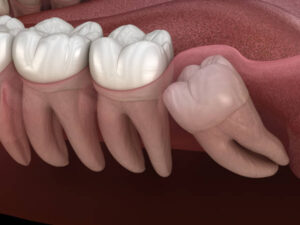Are your wisdom teeth causing you pain or discomfort? Or are you just curious about these infamous teeth? Either way, this is your complete guide to understanding wisdom teeth – what they are, why we have them, and what happens when they start causing trouble.
What Are Wisdom Teeth?
These teeth are the last to make an appearance in your mouth, typically surfacing in your late teens or early twenties. Also known as third molars, they are called ‘wisdom’ teeth because they come at a time when you’re transitioning into adulthood and supposedly gaining wisdom. However, due to their late arrival, they often don’t have enough room to grow properly, leading to a host of potential problems.
Why Do These Teeth Cause Problems?
When your jaw doesn’t have enough space for your third molars, they can become impacted. This means they are trapped in your jaw or under your gums. An impacted wisdom tooth can cause several problems, including pain, infection, and damage to the surrounding teeth. They can also cause gum disease and tooth decay if they aren’t properly cleaned, which can be difficult due to their location.
Signs You Might Have Problems With These Teeth
While some people never have any issues with their wisdom teeth, others aren’t so lucky. Here are some signs you might be experiencing wisdom teeth problems:
- Pain or discomfort at the back of your mouth, behind your molars
- Swelling, redness, or tenderness in your gums in the same area
- Difficulty opening your mouth
- Bad breath or an unpleasant taste in your mouth
If you’re experiencing any of these symptoms, it’s a good idea to see your dentist as soon as possible.
How Are These Problems Diagnosed and Treated?
Your dentist will be able to determine if your third molars are causing problems through an oral examination and dental X-rays. If they are impacted, your dentist might recommend having them removed. This is a common procedure and can usually be done in your dentist’s office.
Does Wisdom Teeth Removal Hurt?
One of the most common questions about these teeth removals is whether they hurt. The answer is that you shouldn’t feel any pain during the procedure, as you’ll be given an anesthetic. However, you might feel some discomfort and swelling in the days following the extraction. Your dentist will give you instructions for managing this, which might include over-the-counter pain medication and ice packs.
How to Avoid Third Molars Problems
Unfortunately, there’s no surefire way to prevent wisdom teeth problems. Whether or not your third molars cause issues depends largely on your genetics. However, maintaining good oral hygiene and having regular dental check-ups can help detect potential problems early on.
While wisdom teeth can cause some discomfort and potential dental issues, they are a normal part of your dental journey. With regular dental check-ups, any potential problems can be identified and treated before they cause significant trouble. So, as you grow wiser with age, remember to keep a keen eye on your dental health, especially when it comes to your wisdom teeth!




